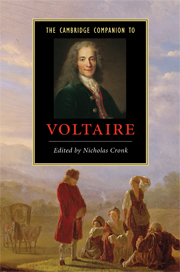Book contents
- Frontmatter
- Introduction
- 1 The making of a name: a life of Voltaire
- 2 Voltaire and authorship
- 3 Voltaire: philosopher or philosophe?
- 4 Voltaire and clandestine manuscripts
- 5 Voltaire and the myth of England
- 6 Voltaire’s masks: theatre and theatricality
- 7 Voltaire as story-teller
- 8 Candide
- 9 Voltaire and history
- 10 Voltaire’s correspondence
- 11 Voltaire: pamphlets and polemic
- 12 Voltaire and the politics of toleration
- 13 Voltaire and the Bible
- 14 The Voltaire effect
- Further reading
- Index
7 - Voltaire as story-teller
Published online by Cambridge University Press: 28 May 2009
- Frontmatter
- Introduction
- 1 The making of a name: a life of Voltaire
- 2 Voltaire and authorship
- 3 Voltaire: philosopher or philosophe?
- 4 Voltaire and clandestine manuscripts
- 5 Voltaire and the myth of England
- 6 Voltaire’s masks: theatre and theatricality
- 7 Voltaire as story-teller
- 8 Candide
- 9 Voltaire and history
- 10 Voltaire’s correspondence
- 11 Voltaire: pamphlets and polemic
- 12 Voltaire and the politics of toleration
- 13 Voltaire and the Bible
- 14 The Voltaire effect
- Further reading
- Index
Summary
Some years ago, a critic rightly denounced as 'almost scandalous' the fact that Voltaire had been studied far more as a thinker than as a writer. Since then many studies on Voltaire's writing have appeared, yet the restrictive notion of literature inherited from the nineteenth century remains preponderant. If the contes and the tragedies seem 'naturally' to lend themselves to literary analysis, the same cannot be said for his other works, which continue to be studied from an essentially ideological perspective, with insufficient attention being paid to the formal qualities of the writing. The challenge is not so much to study the figures of writing, according to some outmoded notion of 'style', as to broaden the notion of literature, embracing rhetoric and history so as to come closer to the eighteenth century's understanding of literature.
Comedy of masks
It has been said that Voltaire 'thinks narratively'. Even in the case of his philosophical or historical prose, his arguments are readily resolved into short narratives or dazzling anecdotes whereby the reasoning process takes a narrative (and emotional) turn. With Voltaire, arguments are first and foremost personae or masks, and this essential trait of his writing needs to be studied across all the literary genres which he practised. In fact, in studying Voltaire as a 'story-teller' (conteur), we should not limit ourselves to the texts traditionally characterised as contes. We need to look beyond to the large quantity of short texts situated on the frontiers of fiction and philosophical propaganda: the pamphlets, short dialogues, fables, allegories, philosophical fragments - the 'scraps' ('rogatons') as Voltaire called them - which multiplied in number from the 1760s, as the battle against l'Infame intensified.
- Type
- Chapter
- Information
- The Cambridge Companion to Voltaire , pp. 109 - 124Publisher: Cambridge University PressPrint publication year: 2009

